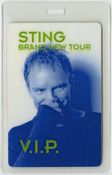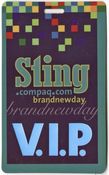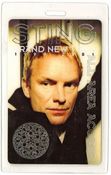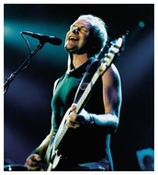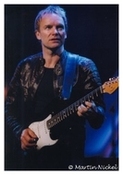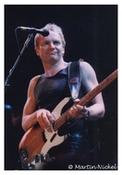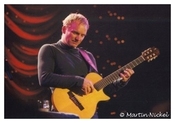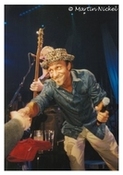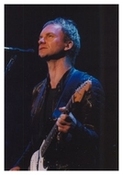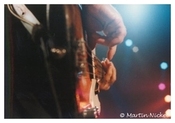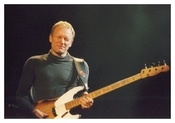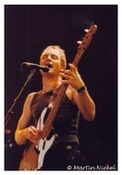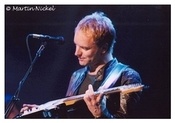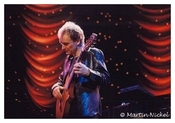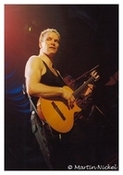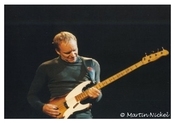
Brand New Day
May
30
2000
Barcelona, ES
Palau des Esporteswith Nitin Sawhney
Sting in Barcelona...
The man who was leader of the Police offered a broad run-through of his career last night in the Palau d'Esports in Barcelona.
There atmosphere of a party reigned at the Sting concert. A mainly young public, some parents with their children; sons with girlfriends and the girlfrinds next to women who, from their age, could have been their mothers, occupying the first rows of a practically full Palau d'Esports. Nearly eight thousand people were singing along to Sting's old songs last night, at the same time maintaining a respectful indifference before the new offerings of the creator of 'Roxanne'.
Just before nine, the concert began, before general apathy, with the British-Asian Nitin Sawhney, an artist from the acid-jazz scene who offered an original fusion of Asian references with the latest in electronic music. But the man playing the leading role of the night was Sting, and, while Sawnhey was unfolding his musical arabesques, the audience were busying themselves looking for a good seat, awaiting the arrival of the star.
On ten o'clock Sting made his entrance, the ''golden (dyed) blonde'' or the ''interesting little mature one'', according to some people. The first bars of 'A Thousand Years', from his latest record, 'Brand New Day', began the Barcelonian presentation of the ex frontman of The Police, that fifty-year-old rocker who has made his smile - and optimistic songs - his unequivocal trade mark.
Sting appeared in the midst of general shouting and cheering without getting in a flap, guitar in hand; an instrument that, together with the electric bass, accompanied him alternately throughout the two long hours of his performance. At his side, a high-class band: six musicians of proven effectiveness, amongst whom playing the guitar was Dominic Miller and the drums Manu Katche, a veteran of Peter Gabriel's group. A flexible band able to transmit, for example, the contagious joy of 'Set Them Free', the second song of the night. But with the necessary authority to follow the idiosyncratic voice of the ''boss'' along more complicated musical paths, tipping towards jazz.
By the fourth song, 'Perfect Love', it was time for a greeting: ''Me alegro de estar en Barcelona'' - ''I'm glad to be in Barcelona'', from a stage defined by a black background and some white strips of material, lit by a set of lights as original as effective. In total there were about twenty songs, in a repertoire dominated by the new tunes - more than half a dozen - from the nearly unknown, new 'Brand New Day', and these were little sung-along-to. Above all this was the case compared with the reception Sting's old hits, either from his time with the Police or from his solo career, had. At those moments, when songs from fifteen or twenty years ago were being played, you could feel the willingness of the audience to acknowledge them.
The songs 'Together', 'All This Time', 'Fields' and 'Magic followed each other in a contained ''crescendo'' that exploded with the arrival of 'Roxanne', an indispensable song in any performance of Sting's. And after, the classics 'Bring on the Night' and 'One World...' that formally closed the concert. But the thing, evidently, didn't finish there, and the singer returned to joyfully conclude the show in a Police vein.
'Message in a Bottle', sung solo, with acoustic guitar and the accompaniment of an improvised choir of the almost eight thousand throats that filled the concert. Sting was in a good mood, repeatedly shaking hands with and greeting the audience. And the audience were grateful for the gesture, the load of songs and his habitual ''Ieooo, Ieeeooo!''s. There are definitely worse ways to spend an evening.
(c) La Vanguardia by Salvador Llopart/translated by Abigail Dowling
The man who was leader of the Police offered a broad run-through of his career last night in the Palau d'Esports in Barcelona.
There atmosphere of a party reigned at the Sting concert. A mainly young public, some parents with their children; sons with girlfriends and the girlfrinds next to women who, from their age, could have been their mothers, occupying the first rows of a practically full Palau d'Esports. Nearly eight thousand people were singing along to Sting's old songs last night, at the same time maintaining a respectful indifference before the new offerings of the creator of 'Roxanne'.
Just before nine, the concert began, before general apathy, with the British-Asian Nitin Sawhney, an artist from the acid-jazz scene who offered an original fusion of Asian references with the latest in electronic music. But the man playing the leading role of the night was Sting, and, while Sawnhey was unfolding his musical arabesques, the audience were busying themselves looking for a good seat, awaiting the arrival of the star.
On ten o'clock Sting made his entrance, the ''golden (dyed) blonde'' or the ''interesting little mature one'', according to some people. The first bars of 'A Thousand Years', from his latest record, 'Brand New Day', began the Barcelonian presentation of the ex frontman of The Police, that fifty-year-old rocker who has made his smile - and optimistic songs - his unequivocal trade mark.
Sting appeared in the midst of general shouting and cheering without getting in a flap, guitar in hand; an instrument that, together with the electric bass, accompanied him alternately throughout the two long hours of his performance. At his side, a high-class band: six musicians of proven effectiveness, amongst whom playing the guitar was Dominic Miller and the drums Manu Katche, a veteran of Peter Gabriel's group. A flexible band able to transmit, for example, the contagious joy of 'Set Them Free', the second song of the night. But with the necessary authority to follow the idiosyncratic voice of the ''boss'' along more complicated musical paths, tipping towards jazz.
By the fourth song, 'Perfect Love', it was time for a greeting: ''Me alegro de estar en Barcelona'' - ''I'm glad to be in Barcelona'', from a stage defined by a black background and some white strips of material, lit by a set of lights as original as effective. In total there were about twenty songs, in a repertoire dominated by the new tunes - more than half a dozen - from the nearly unknown, new 'Brand New Day', and these were little sung-along-to. Above all this was the case compared with the reception Sting's old hits, either from his time with the Police or from his solo career, had. At those moments, when songs from fifteen or twenty years ago were being played, you could feel the willingness of the audience to acknowledge them.
The songs 'Together', 'All This Time', 'Fields' and 'Magic followed each other in a contained ''crescendo'' that exploded with the arrival of 'Roxanne', an indispensable song in any performance of Sting's. And after, the classics 'Bring on the Night' and 'One World...' that formally closed the concert. But the thing, evidently, didn't finish there, and the singer returned to joyfully conclude the show in a Police vein.
'Message in a Bottle', sung solo, with acoustic guitar and the accompaniment of an improvised choir of the almost eight thousand throats that filled the concert. Sting was in a good mood, repeatedly shaking hands with and greeting the audience. And the audience were grateful for the gesture, the load of songs and his habitual ''Ieooo, Ieeeooo!''s. There are definitely worse ways to spend an evening.
(c) La Vanguardia by Salvador Llopart/translated by Abigail Dowling

